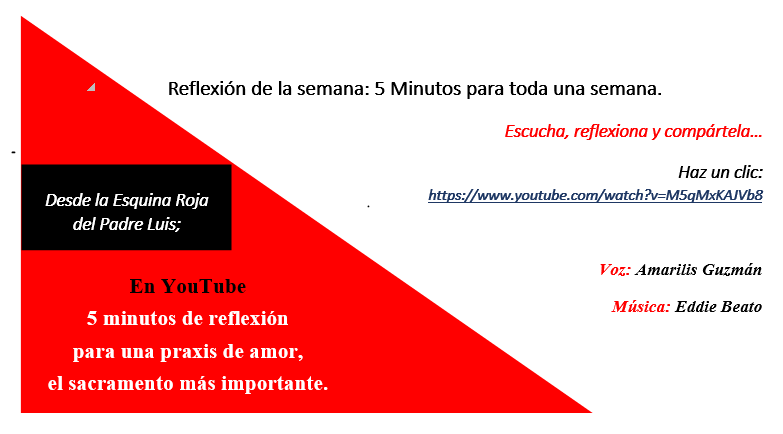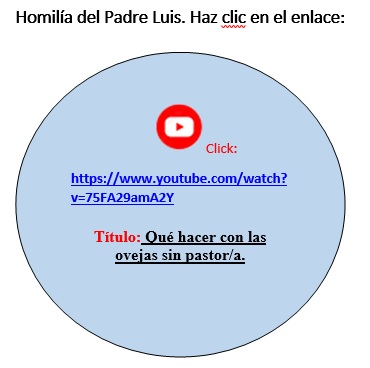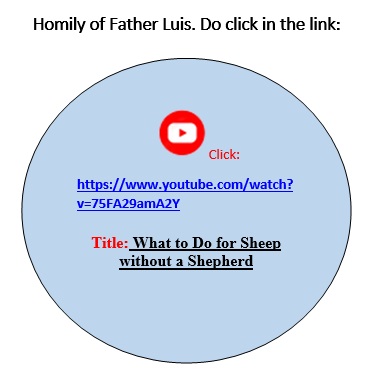Ahora tenemos que darle forma a lo que algun@s han comenzado a llamar; La Iglesia en Casa. Aunque yo me sigo preguntando; ¿qué hacen quienes no tienen un hogar? Por esto a la misma vez, estoy declarando desde hoy en nuestra Iglesia Santa Cruz una jornada de cuaresma de oración, ayuno y leer la Biblia en el Tiempo del Coronavirus.
Misa domingo 23 de julio / Mass Sunday July 23th
 |
 |
|
Recuerda que tenemos Misa mañana domingo en ASL y español a las 12:00pm y la misma será presencial y Facebook. Enlace de Facebook es: https://m.facebook.com/HolyroodSCruz/ El enlace para el boletín y lecturas bíblicas es: https://www.dropbox.com/s/i10gybloa4qj5rb/Bulletin-SPANISH-EDITED-JULY%2... Durante el sermón (Juan 6: 1-21) voy a afirmar que para hacer espacio para el alimento espiritual que ofrece Jesús, debemos matar de hambre nuestras debilidades humanas como el juicio, la indiferencia y el aislamiento y alimentarnos de bondad, compasión, comunidad y generosidad. En otras palabras, debemos alimentarnos de las características de Jesús para llegar a ser más como él. La multitud no entendió lo que estaba sucediendo. Tenían el estómago lleno, pero todavía tenían hambre. No se dieron cuenta de que si aceptaban el alimento espiritual que Jesús les ofreció, nunca volverían a tener hambre espiritual. Jesús había estado enseñando a la multitud todo el día, y era casi la hora de la cena. L@s discípul@s querían que Jesús despidiera a la gente para que pudieran ir a comprar comida a los pueblos y aldeas vecinas. Jesús tenía otras ideas. Les dijo a los discípulos que alimentaran a la gente. Vemos las reacciones de dos de los discípulos a la instrucción de Jesús. Felipe vio la necesidad de un milagro y calculó las probabilidades. Trató de demostrar que no se podía hacer. ¿Cuántas veces somos como Felipe? ¿Con qué frecuencia fallamos en ver lo que Dios está haciendo porque estamos enfocad@s en nuestros deseos y necesidades egoístas? Andrés por otro lado, se propuso tratar de resolver el problema, y la solución que encontró es la clave de la primera parte de esta historia. Buscó comida entre la gente, pero solo encontró a un niño pequeño con un pequeño almuerzo que parecía inadecuado para la tarea que tenía entre manos. Tenemos que darle crédito a Andrés por al menos intentar encontrar una solución al problema. Esta historia muestra la diferencia entre dos tipos de iglesias: misionales y de mantenimiento. Las iglesias misionales dan la bienvenida a todas las situaciones y ven el potencial al tiempo que reconocen los desafíos que estas situaciones crean. Las iglesias de mantenimiento se enfocan en crear comités que toman decisiones y no discípul@s. Las iglesias de mantenimiento se distancian de los problemas porque están demasiado ocupadas teniendo reuniones de comité. Las iglesias de mantenimiento están llenas de tensión porque l@s miembros no saben qué va a pasar ni cómo responder. Hacen lo suficiente para arreglárselas. Las iglesias misionales buscan cosas que hacer, incluso cuando sus miembros ya están haciendo cosas. Creen que debido a que Dios está en lo que están haciendo, Dios les proporcionará todo lo que necesiten. Las iglesias de mantenimiento están paralizadas por el tamaño y el alcance de la tarea que tienen por delante, pero las iglesias misionales dividen la tarea en partes manejables. No intentan hacer todo de una vez porque saben que no pueden ser todo para tod@s todo el tiempo. Jesús acepta sus limitaciones y solo espera que trabajen con lo que tenemos y con las próximas personas que conozcan. ¿Qué tipo de iglesia preferiríamos ser? Y recuerda, la iglesia no es un museo para personas santas. La Iglesia es un hospital para sanar a personas pecadoras como nosotr@s. Ven para que te sanes. Bendiciones Luis + |
Remember that tomorrow Sunday we have Mass, ASL & English at 10:00am and it will be in person, Zoom, and on Facebook. Zoom link is: The link for the Facebook is: And the link for the Bulletin and Bible Readings is: During the sermon (John 6:1-21) I’m going to claim that in order to make room for the spiritual food Jesus offers, we must starve our human weaknesses such as judging, indifference and isolation and feed on kindness, compassion, community and generosity. In other words, we must feed on the characteristics of Jesus in order to become more like him. The crowd did not understand what was happening. They got their stomachs full, but their spirits were still hungry. They did not realize that if they accepted the spiritual food Jesus offered, they would never be spiritually hungry again.Jesus had been teaching the crowd all day, and it was almost time for the evening meal. The disciples wanted Jesus to dismiss the people so they could go and buy food in the neighboring towns and villages. Jesus had other ideas. He told the disciples to feed the people. We see the reactions of two of the disciples to Jesus’ instruction. Philip saw the need for a miracle and calculated the odds. He tried to prove that it could not be done. How many times are we like Philip? How often do we fail to see what God is doing because we are focused on our selfish desires and needs? Andrew, on the other hand, set out to try to solve the problem, and the solution he found is the key to the first part of this story. He searched for food among the people, but he found only one small boy with a small lunch that seemed inadequate for the task at hand. We have to give credit to Andrew for at least trying to find a solution to the problem. This story shows the difference between two types of churches-missional and maintenance. Missional churches welcome all situations and see the potential while acknowledging the challenges these situations create. Maintenance churches focus on creating committees that make decisions and not disciples. Maintenance churches distance themselves from problems because they are too busy having committee meetings. Maintenance churches are filled with tension because the members don’t know what’s going to happen or how to respond. They do just enough to get by. Missional churches look for things to do, even when their members are already doing things. They believe that because God is in what they are doing, God will provide everything that they will need. Maintenance churches are paralyzed by the size and scope of the task before them, but missional churches break the task down into manageable parts. They do not try to do everything all at once because they know they can’t be everything to everyone all of the time. Jesus accepts their limitations and only expects them to work with what we have and with the next people they meet. Which type of church would we prefer to be? And remember, the church is not a museum for holy people. The Church is a hospital to heal sinful people like us. Come to heal yourself. Blessings, Luis+ |
 |
|
 |
 |
- Inicie sesión para comentar
